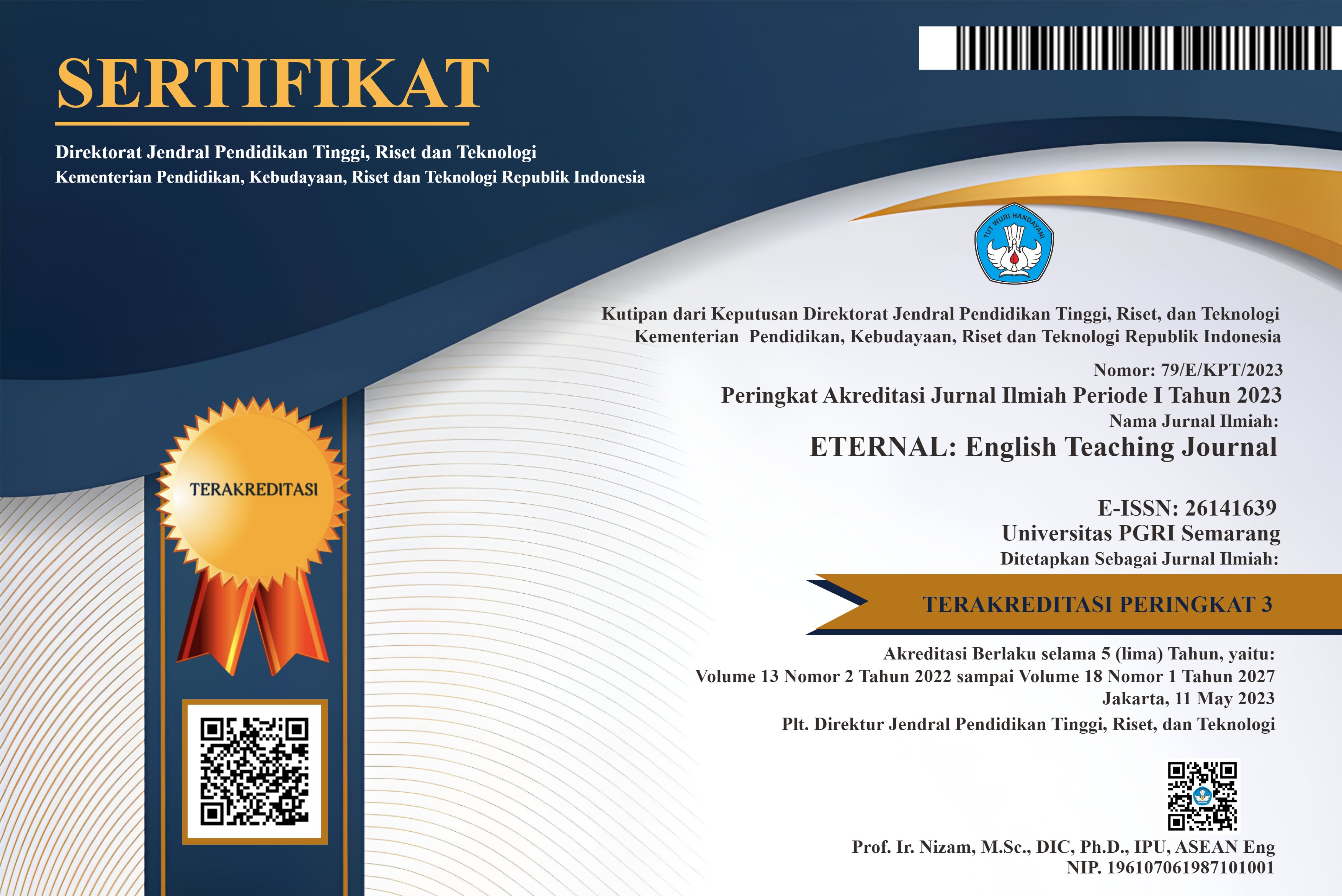Exploring Pre-Service English Teachers’ Knowledge toward GBA Approach in Indonesian EFL Curriculum
DOI:
https://doi.org/10.26877/eternal.v15i1.313Keywords:
Pre-Service English Teachers, GBA, Teachers’ Knowledge, Indonesian EFL CurriculumAbstract
The aim of research was to figure out pre-service English teachers’ capability, in order to comprehend and to implement the Genre-Based Approach (henceforth, GBA) in EFL classrooms. This study used a qualitative case study approach to investigate the understanding of pre-service English teachers towards the GBA in the Indonesian newest curriculum, called Kurikulum Merdeka (Independent Curriculum). The research was conducted at Al Hikmah Teacher Institute. Non probability with purposive sampling type is a technique was used to select the participants. Furthermore, for further understanding of the data, some selected participants were interviewed by the researcher. In this study, questionnaires, structured interviews, and document collection were applied as instruments. The interactive model of data analysis proposed by Miles and Huberman was adopted in analyse the data. In short, the study revealed three findings, there are; 1) most of the pre-service English teachers (71.5%) of the participants did have not sufficient knowledge; 2) the rest of the participants (28.5%) had sufficient knowledge of the content knowledge (henceforth, CK); and 3) the implementation of the GBA in English Language Teaching (henceforth, ELT).
References
Al-Jaro, M., Asmawi, A., & Hasim, Z. (2017). Content Analysis of the Pedagogical Content Knowledge in the Curriculum of the Yemeni EFL Teacher Education Program. SSRN Electronic Journal, 8 (1), 264 - 279. https://doi.org/10.2139/ssrn.294590
Hariri, A., & Lina Aris Ficayuma. (2023). The Use of Authentic Material in English Classroom Teaching: Indonesian New Curriculum. IJET (Indonesian Journal of English Teaching), 12(1), 94–103. https://doi.org/10.15642/ijet2.2023.12.1.94-103
Anggreni, N. P. D., Utami, IGA L. P., & Dewi, K. S. (2020). English Teachers’ Pedagogical Content Knowledge: The Degree of Consistency between Perception and Implementation. ELT Echo Journal, 5 (1), 66-78.
Agustien, H.R. (2020). Implementing a Text-Based Approach in English Language Teaching. Malang: TEFLIN Teacher Development Series.
Badiru, A. B., & Cheung, J. Y. (2002). Fuzzy Engineering Expert Systems with Neural Network Applications. J. Wiley. http://www.123library.org/book_details/?id=9935
Borg, S. (2003). Teacher Cognition in Language Teaching: A Review of Research on What Language Teachers Think, Know, Believe, and Do. Language Teaching Journal, 36 (2), 81-109, https://doi.org/10.1017/S026144480300190
Borg, R. W. and M. D Gall. (2007). Educational Research: An Introduction. Boston: Pearson Education.
Emilia, Emi. (2011). Pendekatan Genre Based Approach dalam Pengajaran Bahasa Inggris: Petunjuk Bagi Guru. Bandung: Rizqi Press.
Ficayuma, L.A. (2022). Identifying Language Proficiency and SLA of English Education Department Students for Designing an Intercultural Communication E-book. International Research-Based Educational Journal, 4 (2), 83-99, http://dx.doi.org/10.17977/um043v4i2p%25p
Hu, B., & Tian, L. (2012). Do Teachers and Students Share Similar Beliefs about Teaching and Learning Strategies? System Journal, 40 (2), 237–254. https://doi.org/10.1016/j.system.2012.04.001
Khatibi, M. B. (2014). The Effect of Genre-Based Teaching on EFL Learners’ Speaking Performance. IJERLT, 12 (1), 38-52.
Lincoln, Y. S., & Guba, E. G. (1985). Naturalistic Inquiry. Beverley Hills: Sage Publication.
Liu, S. (2013). Pedagogical Content Knowledge: A Case Study of ESL Teacher Educator. English Language Teaching, 6 (7), p128. https://doi.org/10.5539/elt.v6n7p128
Mayne, H. (2019). Pedagogical Content Knowledge and Social Justice Pedagogical Knowledge: Re-envisioning a Model for Teacher Practice. Research in Educational Administration & Leadership, 4 (3), 701-718. https://doi.org/10.30828/real/2019.3.9
Miles, M. B., & Huberman, A. M. (2014). Qualitative Data Analysis (2nd Ed). London: Sage Publications.
Merriam, S. B. (1998). Qualitative research and case study applications in education. San Francisco, CA: Jossey-Bass.
Ramadhan, R. (2015). Students and Teachers’ Attitudes Towards Teacher’s Corrective Feedback in Teaching Writing of English as a Foreign Language: A Case Study at Surabaya State University of the Fifth Semester Students in Academic Year 2014/2015(Master's Thesis, Universitas Sebelas Maret, Surakarta, Indonesia). Retrieved from https://digilib.uns.ac.id/dokumen/detail/45897/
Rifpriyandi, Q., & Sudartini, S. (2017). Improving Students’ Speaking Skills through the Genre-Based Approach in Grade X of Chemistry Analysis of SMK SMTI Yogyakarta. English Language Teaching Journal, 6 (1), 126-130.
Hapsari, T., Hikmat, M. H., & Fatimah, S. (2017). The Implementation Of a Genre-Based Approach In Teaching Speaking To The Eighth Grade Students At Smp Muhammadiyah 4 Surakarta In 2015/2016 Academic Year (Doctoral dissertation, Universitas Muhammadiyah Surakarta).
Hyland, K. (2004). Genre and second language writing. Michigan, US: University of Michigan Press Siregar, Y. D. A., & Ramadhan, R. (2018).
Transformative Pedagogy of Multiliteracies and the Challenges of Cultural Constraint in Indonesia. JELTII Journal, 1 (2), 20-33.
Suharyadi, Widiawati, U., & Basthomi, Y. (2021). Exploring EFL Teachers’ New Pedagogical Content Knowledge of Genre-Based Approach. English Review: Journal of English Education, 10 (1), 1- 14. doi: https://doi.org/10.25134/erjee.v10i1.5348
Triastuti, A. (2020). Assessing English Pre-service Teachers’ Knowledge Based of Teaching: Linking Knowledge and Self-Portrayal. TEFLIN Journal, 31(1), 108-137. http://dx.doi.org/10.15639/teflinjournal.v31i1/108-138.
Wu, Y.-T., & Wang, A. Y. (2015). Technological, Pedagogical, and Content Knowledge in Teaching English as a Foreign Language: Representation of Primary Teachers of English in Taiwan. The Asia Pacific Education Researcher, 24 (3), 525–533. https://doi.org/10.1007/s40299-015-0240-7
Wulandari, Ella. (2019). Teacher’s Technological Pedagogical Content Knowledge in Developing Learning Materials. Lingua Pedagogia Jounal, 1 (1), 29-45. https://journal.uny.ac.id/index.php/lingua-pedagogia/article/view/23983/pdf
Wiersma, W. (1995). Research Methods in Education – An Introduction: Sixth Edition. USA: Allyn and Bacon.







